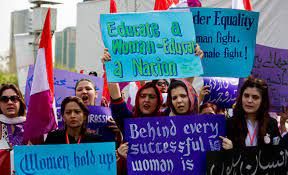Every year on March 8th, we mark International Women's Day. The social, economic, cultural, and political accomplishments of women are being celebrated on a worldwide scale. Also, it is a day to acknowledge the continued obstacles women face in attaining gender equality and to demand solutions.
The first decades of the 20th century saw the global emergence of women's movements, which is when International Women's Day first appeared. On February 28, 1909, the United States celebrated the inaugural National Women's Day to honour the New York City garment workers' strike. The next year, International Women's Day was created by Socialist International to support women's suffrage and honour the accomplishments of women in all walks of life.
Women in Russia organised a "Bread and Peace" strike in 1917, calling for an end to the conflict and improved living circumstances. The Russian Revolution was sparked by this strike, which got underway on March 8th and contributed to the establishment of women's rights in Russia. International Women's Day was first recognised by the UN in 1975, and since then it has grown into a day dedicated to bringing attention to gender disparities and promoting the rights and empowerment of women.
The commemoration in Pakistan includes a variety of activities, events, and initiatives to increase public awareness of women's rights and gender equality. Women's organisations, civil society organisations, and human rights campaigners mark the day. The Aurat March is one of the biggest celebrations of Women's Day in Pakistan.It is a grassroots movement that was founded in 2018 with the intention of increasing gender equality in Pakistani society and bringing attention to women's concerns. Every year, the Aurat March is held in a number of Pakistani cities, and both men and women from all backgrounds participate.
Women's Day festivities in Pakistan have seen significant controversy and criticism in recent years, notably in relation to the Aurat March. Several conservative groups have denounced the movement for promoting "western ideals" and have accused it of being "anti-Islam". The organizers of the Aurat March and other Women's Day activities nevertheless continue to advocate for greater gender equality and to oppose patriarchal standards and viewpoints in Pakistani culture.
Another problem affecting women in Pakistan is sexual harassment. According to a report by the Aurat Foundation, 97% of Pakistani women have been the victim of sexual harassment in public.
In order to combat violence against women, the Pakistani government has passed laws protecting their rights and set up crisis centres and hotlines for women in need. Yet, much more has to be done to address the underlying issues that lead to violence against women and alter the cultural attitudes that support this violence in Pakistani culture.
In Pakistan, there are several cultural and religious customs that discriminate against women and uphold patriarchal beliefs. It should be a priority to oppose these customs and advance gender equality through more liberal interpretations of religion and culture.
All parties involved in these steps—including the government, civil society organisations, and communities—must work together continuously and in concert. Real change won't happen overnight, but safeguarding Pakistani women's rights and dignity is crucial.







0 Comments